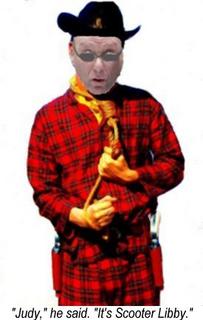 Today, alleged reporter Judy Miller finally broke her silence about the Valerie Plame/Treasongate story and why she went to jail. She needn't have bothered, as it turns out.
Today, alleged reporter Judy Miller finally broke her silence about the Valerie Plame/Treasongate story and why she went to jail. She needn't have bothered, as it turns out.Mark Kleiman observes Judy seems to have experienced a senior moment before the grand jury. In fact, she had quite a few of them, as Needlenose documents:
She is clearly describing (herself) obstructing justice, but in a way that will be hard to prove. Where there are notes that show she discussed the agent with Libby, she gives other reasons those notes might be there or "can't recall" why they are there. Where there are no notes it's "can't recall" and no useful information.Maybe Miller suffers from dyslexia, Wonkette chuckles speculatively.
No, Steve Soto says, there's "evidence that Miller is lying even in what she is telling her own paper now, which explains why she is leaving the Times and would explain why the paper is now seemingly ending its relationship with her."
Judd, over at Think Progress has all the links and the most persuasive take on whether there's any meaning to all of this, other than more embarrassment for the New York Times.
In the meantime, we can't help but be captivated by Miller's grand jury testimony, as she describes it, about one meeting with Libby. She describes it at the very end of her essay:
"Mr. Fitzgerald also focused on the letter's closing lines. 'Out West, where you vacation, the aspens will already be turning,' Mr. Libby wrote. 'They turn in clusters, because their roots connect them.'The chief assistant to the Vice President of the United States. Dressed like a cowboy. Identity hidden behind dark glasses. Wearing a cowboy hat. Meeting a New York Times reporter at a rodeo.
"How did I interpret that? Mr. Fitzgerald asked.
"In answer, I told the grand jury about my last encounter with Mr. Libby. It came in August 2003, shortly after I attended a conference on national security issues held in Aspen, Colo. After the conference, I traveled to Jackson Hole, Wyo. At a rodeo one afternoon, a man in jeans, a cowboy hat and sunglasses approached me. He asked me how the Aspen conference had gone. I had no idea who he was.
'Judy,' he said. 'It's Scooter Libby.'
This is the stuff of pulp fiction. Then again, most of what Miller wrote for the Times was fiction.
Updated Oct. 18
Two days after the above appeared, the Chicago Tribune editorialized about the New York Times revelations:
"[T]he two Times articles leave little doubt that Miller and her editors were guilty of ill-serving their readers -- and the search for truth. Maybe that's why, when asked what she regretted most about how the Times handled this episode, managing editor Jill Abramson offered a stinging reply: "The entire thing."







No comments:
Post a Comment